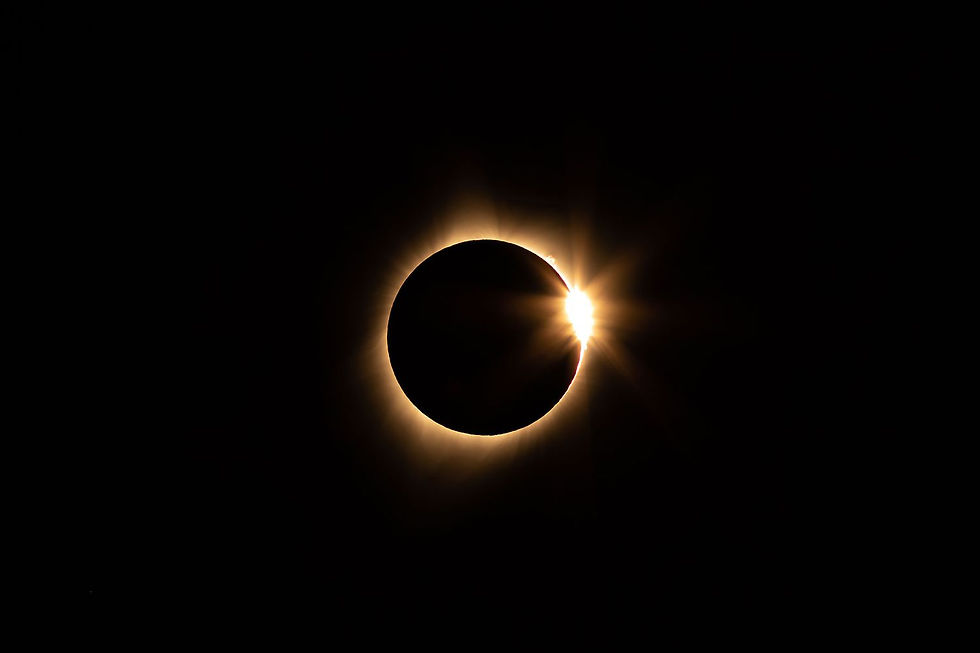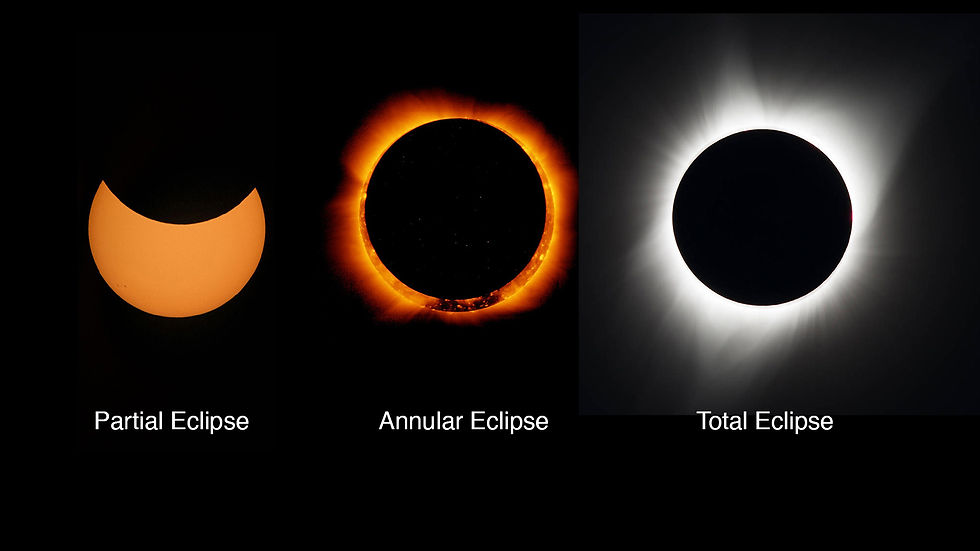Solar Eclipses: Debunked
- Sofia Gaviria
- Nov 6, 2023
- 5 min read
Updated: Nov 6, 2023

Solar eclipses, a kiss between the Sun and the Moon, have been a topic of study for centuries. From ancient to modern civilizations, we’ve all seen the wonder of our celestial neighbors’ interactions. Within the age of technology, we have the ability to go beyond any previous knowledge of our solar system. However, some still believe false and harmful claims about eclipses, and we’re here to debunk them.

What is an Eclipse?
According to NASA, a solar eclipse is a phenomenon in which the Sun, the Moon, and the Earth line up so that the Sun is covered by the moon, casting a partial or full shadow of the Sun’s light. There are multiple types of solar eclipses, but total solar eclipses happen every 18 months and are considered by some to be the most fascinating. They happen when the Moon and Sun seem to have the same diameter due to the distance between the two bodies, fully blocking out the Sun’s light. This shadow that causes it to seemingly turn into night is called “totality” and it only happens for about 1–2 minutes before the sun is uncovered by the moon. Next, an annular solar eclipse happens when the moon is further away from Earth, causing it to have a smaller diameter than the sun and creating a ring of light around the moon, called a “ring of fire”. Finally, partial solar eclipses happen when the moon isn’t directly aligned with the sun and Earth, causing it to only partially cover the sun.
Solar Eclipses & Pregnancy
However, despite having scientific explanations for solar eclipses, there are still plenty of people who believe bad omens are caused by solar eclipses. Famously, in India, the Surya Grahan or the solar eclipse is believed to be caused by two demons: Ketu and Rahu who feed on the sun’s life-giving light, casting a bad omen on anything that symbolizes life. This has caused the belief that pregnant women and children must stay indoors because they are the most susceptible to the bad omen and would affect the growing fetus by giving it birthmarks, blindness, or cleft lips. Women are also advised to not have or use any sharp objects as these can be used against them by the demons and cause harm. Additionally, temples are closed and they, along with water and statues, must be purified with Tulsi leaves, which are worshiped as a goddess in Hinduism since they are believed to be able to ward off evil with their sacred parts. Nevertheless, there has not been any research supporting the theory that spiritual negative energy neither exists nor is released by the coverage of the sun by the moon. Everyone, including pregnant women and children, can safely view the eclipse without any risks as long as they’re protected by eclipse glasses (different to regular sunglasses) that have been approved to be used to watch the eclipse.
Solar Eclipses & Blindness
Blindness or “the inability to see or lack a vision” (Cleveland Clinic) is a condition that many people believe that a solar eclipse can cause. With the word “eclipse blindness” floating on the internet as eclipses approach, it may seem like a reasonable assumption to believe that the eclipse can cause blindness. However, eclipse blindness is a term used to refer to solar retinopathy, which is essentially altered color vision and the loss of the central vision after looking at the sun for too long without proper eye protection and according to NASA “the human instinct does not let us look at the sun to the point where we can cause extreme damage”. During an eclipse’s totality, only the sun’s corona is visible and actively releases electromagnetic radiation towards our atmosphere and can cause retinal burns, but considering it would have to travel 150 million kilometers, penetrate the dense atmosphere of the Earth and cause harmful eye damage, it is scientifically impossible to get complete blindness from the phenomenon.
Solar Eclipses and Predictions Toward the Future
Astrology and astronomy, though similarly named, are completely different in terms of their usage. Astrology is “a method of predicting mundane events based upon the assumption that the celestial bodies” (Britannica, 2023) meanwhile, astronomy is “A natural science that studies celestial objects and phenomena” (Britannica, 2023). Although a popular way to predict life events, astrology is based on no scientific findings and is a pseudoscience, a belief that is presented as science but is completely incompatible with the scientific method. Many things are considered pseudoscience, and they tend to have a bad reputation, such as the 2012 phenomenon, the flat-earth theory, moon landing conspiracy theories, climate-change deniers, aromatherapy, and the list goes on. This is not to say that people are not allowed to believe in these things, but they are not considered factual due to the fact that there is no evidence to support them based on the scientific method. People who believe in pseudoscience tend to be an example of the confirmation bias “in which you prove a cause-and-effect relationship by ignoring failures and only consider successful forecasts” (NASA).
Conclusion
In conclusion, there is nothing to be afraid of with solar eclipses. While some religions and cultures fear them, scientists have proven that solar eclipses are nothing but a phenomenon we cannot control. It is also important to note that while there are still many people who believe in these myths about eclipses, our job is to dispel misinformation, not bring their beliefs down. Religious and spiritual people can appreciate and follow their cultures while also believing in the scientific method and its results; it should not be about creating conflict between these two areas of knowledge, but to balance them in life.
References
Boeckmann, Catherine. “Solar Eclipse Folklore, Myths, and Superstitions | Almanac.Com.” Almanac.Com, 2023, https://www.almanac.com/solar-eclipse-folklore-myths-and-superstitions.
Carter, Jamie. “Everything to Know About the Next ‘Great American’ Solar Eclipse.” Travel + Leisure, Travel + Leisure, 7 Apr. 2022, https://www.travelandleisure.com/trip-ideas/space-astronomy/solar-eclipse-2024-how-to-see-it.
“Eclipse Misconceptions | Total Solar Eclipse 2017.” Eclipse 2017, https://eclipse2017.nasa.gov/eclipse-misconceptions. Accessed 1 Nov. 2023.
Kher, Aparna. “Solar Eclipse Myths and Superstitions.” Timeanddate.Com, https://www.timeanddate.com/eclipse/solar-eclipse-myths.html#:~:text=Many%20people%20around%20the%20world,indoors%20during%20a%20solar%20eclipse. Accessed 1 Nov. 2023.
“List of Topics Characterized as Pseudoscience | Encyclopedia MDPI.” Encyclopedia MDPI | Scholarly Community, HandWiki Zheng, 14 Oct. 2022, https://encyclopedia.pub/entry/29269.
“Myths and Superstitions Surrounding Solar Eclipses in India.” Take One Digital Network, 12 Oct. 2023, https://www.takeonedigitalnetwork.com/myths-and-superstitions-surrounding-solar-eclipses-in-india/#:~:text=The%20Sun%20is%20being%20swallowed,to%20be%20a%20bad%20omen.
Sullivan, Jay, and Lisa Hendry. “Solar Eclipse Guide: What They Are and How to Watch Safely | Natural History Museum.” Home | Natural History Museum, 24 May 2021, https://www.nhm.ac.uk/discover/solar-eclipse-guide.html.
Tavernier, Lyle. “The Science of Solar Eclipses and How to Watch With NASA - Teachable Moments | NASA/JPL Edu.” NASA/JPL Edu, 18 Oct. 2023, https://www.jpl.nasa.gov/edu/news/2023/9/28/the-science-of-solar-eclipses-and-how-to-watch-with-nasa/.
“Types of Solar Eclipses - NASA Science.” NASA Science, https://science.nasa.gov/eclipses/types/. Accessed 1 Nov. 2023.
Wigmore, Ivy. “What Is Pseudoscience? | Definition from TechTarget.” WhatIs.Com, TechTarget, 10 Jan. 2018, https://www.techtarget.com/whatis/definition/pseudoscience#:~:text=Pseudoscience%20is%20a%20proposition%2C%20a,experimental%20design%20or%20bad%20data.
Gilbert, Robert Andrew and Pingree, David E.. "astrology". Encyclopedia Britannica, 19 Sep. 2023, https://www.britannica.com/topic/astrology. Accessed 1 November 2023.



Comments